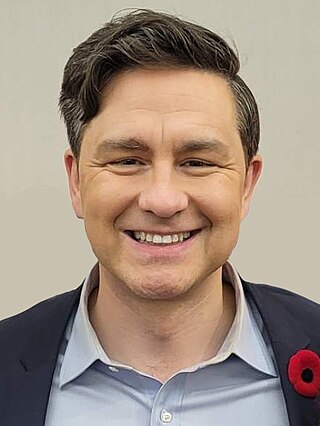Leader of the Official Opposition (Canada)
Position in the Parliament of Canada From Wikipedia, the free encyclopedia
The leader of the Official Opposition (French: chef de l'Opposition officielle), sometimes known as the leader of His Majesty's Loyal Opposition (French: chef de la loyale opposition de Sa Majesté), is the politician who leads the Official Opposition in Canada. This is typically the leader of the party possessing the most seats in the House of Commons that is neither the governing party nor part of a governing coalition.
| Leader of the Official Opposition | |
|---|---|
| Chef de l'Opposition officielle | |
| Style | The Honourable |
| Member of | House of Commons |
| Residence | Stornoway |
| Term length | While leader of the largest party not in government |
| Inaugural holder | Alexander Mackenzie |
| Formation | March 6, 1873 |
| Salary | $299,900 (2024)[1] |
Pierre Poilievre has been the leader of the Opposition since September 10, 2022, when he was elected leader of the Conservative Party of Canada in the party's leadership election.[2]
The office should not be confused with Opposition House leader, who is a frontbencher charged with managing the business of the Opposition in the House of Commons and is formally titled Leader of the Opposition in the House of Commons. There is also a leader of the Opposition in the Senate, who is usually of the same party as the leader of the Opposition in the house.
Name
The term leader of the opposition is used in the Parliament of Canada Act[3] and the Standing Orders of the House of Commons,[4] as is the term official opposition.[5] The terms leader of the loyal opposition, his majesty's opposition,[6] and loyal opposition are sometimes used,[7] but are not in either the act or the standing orders. The word loyal is used to communicate the party's loyalty to monarch of Canada – as the nonpartisan personification of the nation and the state's authority – even as its members oppose the governing party.[6]
Privileges
The leader of the Opposition is entitled to the same levels of pay and protection as a Cabinet minister and is often made a member of the King's Privy Council, generally the only non-government member of the House of Commons afforded that privilege. The leader of the Opposition is entitled to reside at the official residence of Stornoway and ranks thirteenth on the Order of Precedence, after Cabinet ministers and before lieutenant governors of the provinces. In the House of Commons seating plan, the leader of the Opposition sits directly across from the prime minister.
History
Summarize
Perspective
During the 1st Canadian Parliament, the position of the leader of the opposition was not clearly established. The Liberal Party sat on the opposition benches, but it remained a loose coalition of various interests and chose not to name a leader until becoming a more united group.[8] Several historians note that John Sandfield Macdonald was granted the seat reserved for the Opposition leader, though he was an ally of John A. Macdonald[a] and the two had campaigned together in the preceding election.[9][10][11] As Sandfield Macdonald was concurrently Premier of Ontario,[b] he did not play a major role in holding the government to account. Instead, Alexander Mackenzie emerged as a prominent opponent of the government, with some historians describing him as the de facto leader of the Opposition from 1869.[12][13] Mackenzie was recognized as Leader of the Opposition in 1873, after formally assuming the leadership of the Liberal Party.
Despite its importance in the Westminster system, the role was not enshrined in law until 1905. In proposing the measure, Prime Minister Wilfrid Laurier said "the leader of the opposition under our system is just as much a part of the constitutional system of government as the Prime Minister himself."[14] The leader was also granted a $7,000 allowance, per session, in addition to his salary as MP. According to Dean E. Henry, this "made Canada the first entity in the British Empire, probably the first in the world, to pay a state salary to an opposition leader."[15]
Two leaders of the Opposition have died in office: Wilfrid Laurier in 1919 and Jack Layton in 2011.[16]
Leaders of the Official Opposition
Liberal-Conservative Party, Conservative Party of Canada (1867–1942), Progressive Conservative Party of Canada
| Portrait | Name Electoral district (Birth–Death) |
Term of office | Party | Prime minister Party | |||
|---|---|---|---|---|---|---|---|
| Term start[17] | Term end[17] | ||||||
 |
Alexander Mackenzie MP for Lambton (1822–1892) |
March 6, 1873 |
November 5, 1873 |
Liberal | Sir John A. Macdonald Liberal-Conservative | ||
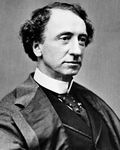 |
Sir John A. Macdonald MP for Kingston (1815–1891) |
November 6, 1873 |
October 16, 1878 |
Liberal-Conservative | Alexander Mackenzie Liberal | ||
 |
Alexander Mackenzie MP for Lambton (1822–1892) |
October 17, 1878 |
April 27, 1880 |
Liberal | Sir John A. Macdonald Liberal-Conservative | ||
| Vacant April 27 – May 3, 1880 | |||||||
 |
Edward Blake MP for Durham West (1833–1912) |
May 4, 1880 |
June 2, 1887 |
Liberal | |||
| Vacant June 3 – 22, 1887 | |||||||
 |
Wilfrid Laurier MP for Quebec East (1841–1919) |
June 23, 1887 |
July 10, 1896 |
Liberal | |||
| Sir John Abbott Liberal-Conservative | |||||||
| Sir John Thompson Liberal-Conservative | |||||||
| Sir Mackenzie Bowell Conservative | |||||||
| Sir Charles Tupper Conservative | |||||||
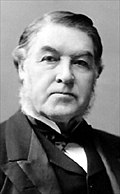 |
Sir Charles Tupper[c] MP for Cape Breton (1821–1915) |
July 11, 1896 |
February 5, 1901 |
Conservative | Sir Wilfrid Laurier Liberal | ||
 |
Robert Borden MP for Halifax (until 1904, from 1908) MP for Carleton (1905–1908) (1854–1937) |
February 6, 1901 |
October 9, 1911 |
||||
 |
Sir Wilfrid Laurier MP for Quebec East (1841–1919) |
October 10, 1911 |
February 17, 1919[d] |
Liberal | Sir Robert Borden Conservative Unionist | ||
 |
Daniel Duncan McKenzie[e] MP for Cape Breton North and Victoria (1859–1927) |
February 17, 1919 |
October 20, 1919 |
||||
 |
William Lyon Mackenzie King MP for Prince (1874–1950) |
October 20, 1919 |
December 28, 1921 |
||||
| Arthur Meighen Conservative | |||||||
 |
Arthur Meighen[f] MP for Grenville (1922–1925) MP for Portage la Prairie (from 1925) (1874–1960) |
December 29, 1921 |
June 28, 1926 |
Conservative | William Lyon Mackenzie King Liberal | ||
 |
William Lyon Mackenzie King MP for Prince Albert (1874–1950) |
June 29, 1926 |
September 24, 1926 |
Liberal | Arthur Meighen Conservative | ||
| Vacant[g] September 25 – October 10, 1926 |
William Lyon Mackenzie King Liberal | ||||||
 |
Hugh Guthrie[h] MP for Wellington South (1866–1939) |
October 11, 1926 |
October 11, 1927 |
Conservative | |||
 |
R. B. Bennett MP for Calgary West (1870–1947) |
October 12, 1927 |
August 6, 1930 |
||||
 |
William Lyon Mackenzie King MP for Prince Albert (1874–1950) |
August 7, 1930 |
October 22, 1935 |
Liberal | R. B. Bennett Conservative | ||
 |
R. B. Bennett MP for Calgary West (1870–1947) |
October 23, 1935 |
July 6, 1938 |
Conservative | William Lyon Mackenzie King Liberal | ||
 |
Robert James Manion MP for London (1881–1943) |
July 7, 1938 |
May 13, 1940 |
||||
 |
Richard Hanson[i] MP for Fredericton (1879–1948) |
May 14, 1940 |
January 1, 1943 |
||||
| Progressive Conservative[j] | |||||||
| Gordon Graydon[k] MP for Peel (1896–1953) |
January 1, 1943 |
June 10, 1945 |
Progressive Conservative | ||||
 |
John Bracken MP for Neepawa (1883–1969) |
June 11, 1945 |
July 20, 1948 |
||||
| Vacant[l] July 21 – December 20, 1948 | |||||||
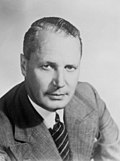 |
George A. Drew MP for Carleton (1894–1973) |
December 20, 1948 |
November 1, 1954 |
Progressive Conservative | |||
| Louis St. Laurent Liberal | |||||||
 |
William Earl Rowe[m] MP for Dufferin—Simcoe (1894–1984) |
November 1, 1954 |
February 1, 1955 |
||||
 |
George A. Drew MP for Carleton (1894–1973) |
February 1, 1955 |
August 1, 1956 |
||||
 |
William Earl Rowe[n] MP for Dufferin—Simcoe (1894–1984) |
August 1, 1956 |
December 13, 1956 |
||||
 |
John Diefenbaker MP for Prince Albert (1895–1979) |
December 14, 1956 |
June 20, 1957 |
||||
 |
Louis St. Laurent MP for Quebec East (1882–1973) |
June 21, 1957 |
January 16, 1958 |
Liberal | John Diefenbaker Progressive Conservative | ||
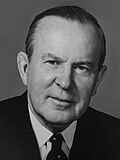 |
Lester B. Pearson MP for Algoma East (1897–1972) |
January 16, 1958 |
April 22, 1963 |
||||
 |
John Diefenbaker MP for Prince Albert (1895–1979) |
April 22, 1963 |
September 9, 1967 |
Progressive Conservative |
Lester B. Pearson Liberal | ||
 |
Michael Starr[o] MP for Ontario (1910–2000) |
September 9, 1967 |
November 6, 1967 |
||||
 |
Robert Stanfield MP for Colchester—Hants (1967–1968) MP for Halifax (from 1968) (1914–2003) |
November 6, 1967 |
February 22, 1976 |
||||
| Pierre Trudeau Liberal | |||||||
 |
Joe Clark MP for Rocky Mountain (born 1939) |
February 22, 1976 |
June 4, 1979 |
||||
 |
Pierre Trudeau MP for Mount Royal (1919–2000) |
June 4, 1979 |
March 3, 1980 |
Liberal | Joe Clark Progressive Conservative | ||
 |
Joe Clark MP for Yellowhead (born 1939) |
March 3, 1980 |
February 2, 1983 |
Progressive Conservative |
Pierre Trudeau Liberal | ||
| Erik Nielsen[p] MP for Yukon (1924–2008) |
February 2, 1983 |
August 29, 1983 |
|||||
 |
Brian Mulroney MP for Central Nova (1939–2024) |
August 29, 1983 |
September 16, 1984 |
||||
| John Turner Liberal | |||||||
 |
John Turner MP for Vancouver Quadra (1929–2020) |
September 17, 1984 |
February 8, 1990 |
Liberal | Brian Mulroney Progressive Conservative | ||
 |
Herb Gray[q] MP for Windsor West (1931–2014) |
February 8, 1990 |
December 10, 1990 |
||||
 |
Jean Chrétien MP for Beauséjour (born 1934) |
December 10, 1990 |
November 4, 1993 |
||||
| Kim Campbell Progressive Conservative | |||||||
 |
Lucien Bouchard MP for Lac-Saint-Jean (born 1938) |
November 4, 1993 |
January 15, 1996 |
Bloc Québécois | Jean Chrétien Liberal | ||
 |
Gilles Duceppe[r] MP for Laurier—Sainte-Marie (born 1947) |
January 15, 1996 |
February 17, 1996 |
||||
 |
Michel Gauthier MP for Roberval—Lac-Saint-Jean (1950–2020) |
February 17, 1996 |
March 15, 1997 |
||||
 |
Gilles Duceppe MP for Laurier—Sainte-Marie (born 1947) |
March 15, 1997 |
June 2, 1997 |
||||
 |
Preston Manning MP for Calgary Southwest (born 1942) |
June 2, 1997 |
March 27, 2000 |
Reform | |||
 |
Deborah Grey[s] MP for Edmonton North (born 1952) |
March 27, 2000 |
September 11, 2000 |
Canadian Alliance | |||
 |
Stockwell Day MP for Okanagan—Coquihalla (born 1950) |
September 11, 2000 |
December 12, 2001 |
||||
 |
John Reynolds MP for West Vancouver– Sunshine Coast (born 1942) |
December 12, 2001 |
May 21, 2002 |
||||
 |
Stephen Harper MP for Calgary Southwest (born 1959) |
May 21, 2002 |
January 9, 2004 |
||||
| Paul Martin Liberal | |||||||
| Grant Hill[t] MP for Macleod (born 1943) |
January 9, 2004 |
March 20, 2004 |
|||||
| Conservative[u] | |||||||
 |
Stephen Harper MP for Calgary Southwest (born 1959) |
March 20, 2004 |
February 6, 2006 |
Conservative | |||
 |
Bill Graham[v] MP for Toronto Centre (1939–2022) |
February 6, 2006 |
December 2, 2006 |
Liberal | Stephen Harper Conservative | ||
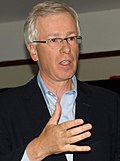 |
Stéphane Dion MP for Saint-Laurent–Cartierville (born 1955) |
December 2, 2006 |
December 10, 2008 |
||||
 |
Michael Ignatieff[w] MP for Etobicoke–Lakeshore (born 1947) |
December 10, 2008 |
May 2, 2011 |
||||
 |
Jack Layton MP for Toronto–Danforth (1950–2011) |
May 2, 2011 |
August 22, 2011[d] |
New Democratic | |||
 |
Nycole Turmel[x] MP for Hull—Aylmer (born 1942) |
August 22, 2011 |
March 24, 2012 |
||||
 |
Tom Mulcair MP for Outremont (born 1954) |
March 24, 2012 |
November 5, 2015 |
||||
 |
Rona Ambrose[y] MP for Sturgeon River—Parkland (born 1969) |
November 5, 2015 |
May 27, 2017 |
Conservative | Justin Trudeau Liberal | ||
 |
Andrew Scheer MP for Regina—Qu'Appelle (born 1979) |
May 27, 2017 |
August 24, 2020 |
||||
 |
Erin O'Toole MP for Durham (born 1973) |
August 24, 2020 |
February 2, 2022 |
||||
 |
Candice Bergen[z] MP for Portage—Lisgar (born 1964) |
February 2, 2022 |
September 10, 2022 |
||||
 |
Pierre Poilievre MP for Carleton (born 1979) |
September 10, 2022 |
Incumbent | ||||
| Mark Carney Liberal | |||||||
Timeline

Deputy leaders of the Opposition
| Portrait | Name Electoral district (Birth–Death) |
Term of office | Party | Leader of the Opposition | ||
|---|---|---|---|---|---|---|
| Term start | Term end | |||||
 |
Denis Lebel[18] MP for Lac-Saint-Jean (born 1954) |
November 19, 2015 |
July 24, 2017 |
Conservative | Rona Ambrose | |
| Andrew Scheer | ||||||
 |
Lisa Raitt[19] MP for Milton (born 1968) |
July 24, 2017 |
October 21, 2019 |
|||
 |
Leona Alleslev[20] MP for Aurora–Oak Ridges–Richmond Hill (born 1968) |
November 28, 2019 |
July 12, 2020 |
|||
 |
Candice Bergen[21][22] MP for Portage–Lisgar (born 1964) |
September 2, 2020 |
February 2, 2022 |
Erin O'Toole | ||
 |
Luc Berthold[23] MP for Mégantic—L'Érable (born 1965 or 1966) |
February 6, 2022 |
September 13, 2022 |
Candice Bergen | ||
 |
Melissa Lantsman MP for Thornhill (born 1984) |
September 13, 2022 |
Incumbent | Pierre Poilievre | ||
 |
Tim Uppal MP for Edmonton Mill Woods (born 1974) |
September 13, 2022 |
Incumbent | |||
Official Opposition Shadow Cabinet
The Official Opposition Shadow Cabinet in Canada is composed of members of the main opposition party and is responsible for holding the government to account and for developing and disseminating the party's policy positions. Members of the Official Opposition are generally referred to as opposition critics, but the term Shadow Minister (which is generally used in other Westminster systems) is also used.
See also
Notes
- Sandfield Macdonald was a member of both the House of Commons of Canada and the Legislative Assembly of Ontario; dual mandates had not yet been abolished.
- Tupper lost his seat in the 1900 election and resigned as party leader and Leader of the Opposition three months later.
- Hanson served as Leader of the Opposition from Manion's resignation until Meighen's election as leader of the Conservative Party. He continued as acting Leader of the Opposition throughout Meighen's term as Conservative leader, as Meighen failed in his attempts to win election to the House of Commons, and continued as acting Leader of the Opposition from Bracken's election as PC leader until his own resignation.
- Graydon served as Leader of the Opposition from Hanson's resignation until Bracken entered Parliament in the 20th general election.
- Bracken immediately vacated his position as Leader of the Official Opposition when he resigned. Because Parliament did not sit in the second half of 1948, it never became necessary for the Progressive Conservatives to name an interim parliamentary leader to cover the gap until Drew could enter parliament via by-election.
- Nielsen served as acting Leader of the Opposition for the two weeks preceding Clark's resignation from the post of leader of the PC Party. He continued as Leader of the Opposition during the 1983 Progressive Conservative leadership campaign in which Clark unsuccessfully ran to succeed himself. Nielsen continued as Leader of the Opposition from Mulroney's election as PC leader until Mulroney entered Parliament via by-election.
- Duceppe served as Leader of the Opposition during the 1996 Bloc Québécois leadership election initiated by Bouchard's sudden resignation from federal politics to become Premier of Quebec.
- Grey served as Leader of the Opposition during the 2000 Canadian Alliance leadership campaign in which Manning unsuccessfully ran to succeed himself. She continued as Leader of the Opposition from Day's election as Alliance leader until Day entered Parliament via byelection.
- Hill served as Leader of the Opposition during the 2004 Conservative leadership election in which Harper successfully ran to be leader of the new party.
- Although the PC Party and Canadian Alliance were recognized as merged on December 7, 2003, by Elections Canada for the purposes of elections law, they did not merge their parliamentary caucuses until February 2, 2004.
- Graham served as interim parliamentary leader, interim Leader of the Liberal Party and Leader of the Opposition until the 2006 Liberal leadership convention.
- Ignatieff served as interim Leader of Liberal Party until being elected Leader in the 2009 Liberal leadership convention.
- Ambrose was elected interim party leader by the Conservative caucus to serve until a permanent leader was elected at the 2017 Conservative Party of Canada leadership election.
- Bergen was elected interim party leader by the Conservative caucus to serve until a permanent leader was elected at the 2022 Conservative Party of Canada leadership election.
References
External links
Wikiwand - on
Seamless Wikipedia browsing. On steroids.
